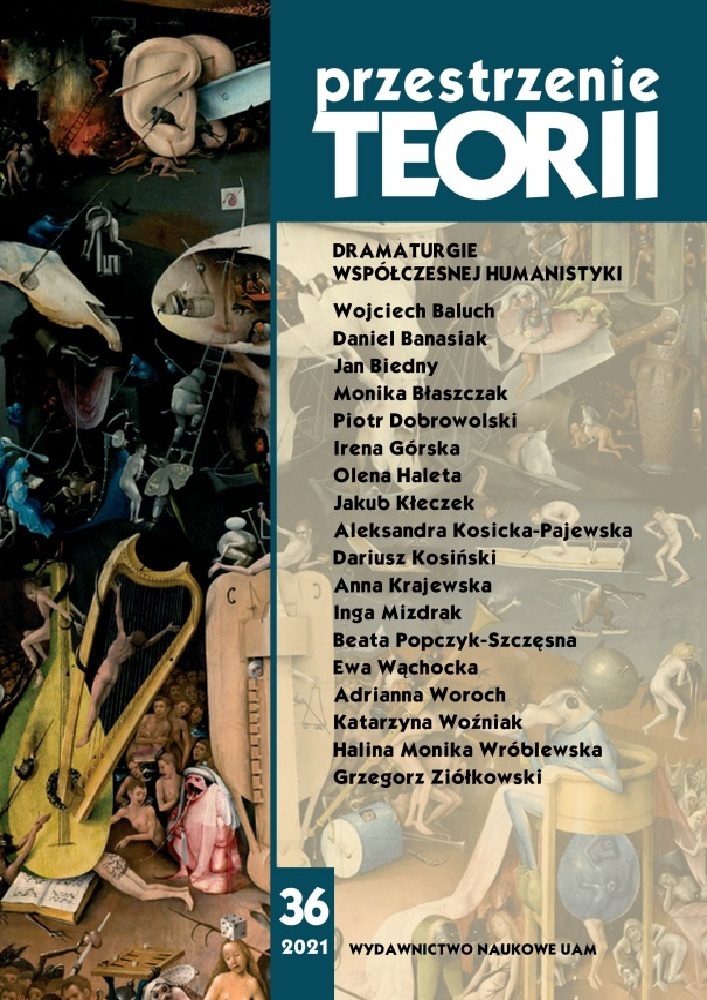Abstrakt
The article discusses Roland Barthes’ experience of photography and presents its distinctive dramaturgy, which emerges from the reflections of the author of The Light of Image. It is played out between attempts at a theoretical grasp of the essence of photography and a personal, intimate experience of being photographed, but also of being a spectator looking at various photographs. Barthes places this experience in two basic perspectives. The first is connected with the process of taking photographs and the second with the experience of the spectator. This also includes the experience of photography with one’s own image, which according to the author, is always an experience of oneself as someone else, and the experience of searching for “the truth of photography”, especially important in the context of the photographs of his deceased mother. It is significant in Barthes’s concept that he is talking about traditional photography which had a completely different character and performed different functions to digital images do today. Moreover, as the author notes, Barthes’s theoretical findings would be untenable in relation to digital photography.
Bibliografia
BIBLIOGRAFIA PODMIOTOWA
Barthes R., Foto-szoki, [w:] idem, Mitologie, przeł. A. Dziadek, wstęp K. Kłosiński, Warszawa 2008.
Barthes R., Światło obrazu. Uwagi o fotografii, przeł. J. Trznadel, Warszawa 2008.
BIBLIOGRAFIA PRZEDMIOTOWA
Barańska K., Bezczas fotografii, [w:] Czas w fotografii, Częstochowa 2002; katalog wystawy Czas w fotografii – czas fotografii (18 grudnia 2001 – 3 lutego 2002, Miejska Galeria Sztuki w Częstochowie).
Baudrillard J., Zbrodnia doskonała, przeł. S. Królak, Warszawa 2008.
Belting H., Antropologia obrazu. Szkice do nauki o obrazie, przeł. M. Bryl, Kraków 2007.
Belting H., Historia twarzy, przeł. T. Zatorski, Gdańsk 2015.
Derrida J., Copy, Archive, Signature. A Conversation on Photography, red. G. Richter, przeł. J. Fort, Stanford University Press, Stanford 2010.
Edwards S., Fotografia. Bardzo krótkie wprowadzenie, przeł. M.K. Zwierżdżyński, Kraków 2014.
Foucault M., La peinture photogénique [1975], [w:] idem, Dits et écrits, éd. par. D. Defert, F. Ewald, Paris, Gallimard, 2001, vol. I.
Leśniak A., Obraz płynny. Georges Didi-Huberman i dyskurs historii sztuki, Kraków 2010.
Morin E., Kino i wyobraźnia, Warszawa 1975.
Olechnicki K., Antropologia obrazu. Fotografia jako metoda, przedmiot i medium nauk społecznych, Warszawa 2003.
Rouillé A., Fotografia. Między dokumentem a sztuką współczesną, przeł. O. Hedemann, Kraków 2007.
Shusterman R., Myślenie ciała. Eseje z zakresu somaestetyki, przeł. W. Małecki, Warszawa 2016.
Sikora S., Doświadczenie fotografii: Roland Barthes, „Rocznik Historii Sztuki” 2006, XXXI.
Solik R.H., Prawda/y (w) fotografii. Od obrazu rzeczywistości do rzeczywistości obrazu, „Er(r)go: Teoria – Literatura – Kultura” 2020, nr 41.
Sontag S., O fotografii, przeł. S. Magala, Kraków 2009.
Soulages F., Estetyka fotografii. Strata i zysk, przeł. B. Mytych-Forajter, W. Forajter, Kraków 2007.
Stiegler B., Obrazy fotografii. Album metafor fotograficznych, przeł. J. Czudec, Kraków 2009.
Sztabiński G., Pamięć fotografii, [w:] Zapomniana sztuka – sztuka pamiętania, red. T. Pękala, Lublin 2019.
Licencja
Autorzy
Autorzy tekstów przyjętych do publikacji w czasopiśmie „Przestrzeniach Teorii” są zobowiązani do wypełnienia, podpisania i odesłania na adres redakcji umowy o udzielenie nieodpłatnej licencji do utworów, z zobowiązaniem do udzielania sublicencji CC.
Zgodnie z umową, autorzy tekstów opublikowanych w czasopiśmie „Przestrzeniach Teorii” udzielają Uniwersytetowi im. Adama Mickiewicza w Poznaniu niewyłącznej i nieodpłatnej licencji oraz zezwalą na użycie sublicencji Creative Commons Attribution-NonCommercial-NoDerivatives 4.0 International (CC BY-NC-ND 4.0).
Autorzy zachowują prawa do dalszego, swobodnego rozporządzania utworem.
Autorzy, którzy wykorzystują w swoim tekście cudze utwory (np. ilustracje, fotografie) proszeni są o dostarczenie do redakcji czasopisma zgodę na publikację od uprawnionych podmiotów.
Użytkownicy
Zainteresowani użytkownicy internetu uprawnieni są do korzystania z utworów opublikowanych po 2015 roku „Przestrzeniach Teorii” tylko w calach niekomercyjnych, pod następującymi warunkami:
- uznanie autorstwa - obowiązek podania wraz z rozpowszechnionym utworem, informacji, o autorstwie, tytule, źródle (odnośniki do oryginalnego utworu, DOI) oraz samej licencji;
- bez tworzenia utworów zależnych - utwór musi być zachowany w oryginalnej postaci, nie można bez zgody twórcy rozpowszechniać np. tłumaczeń, opracowań.
Do wszystkich tekstów opublikowanych przed 2015 r. prawa autorskie są zastrzeżone.
Inne
Uniwersytet im. Adama Mickiewicza w Poznaniu zachowuje prawo do czasopisma jako całości (układ, forma graficzna, tytuł, projekt okładki, logo itp.).

